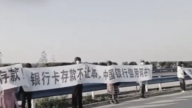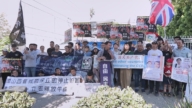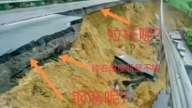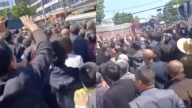【新唐人2014年03月17日訊】全球電腦系統整合服務公司「IBM」,發生在深圳工廠的維權事件還在持續升級。目前IBM已開除了20名工人代表,有超過一半的工人決定離職,這也代表將有500多名工人選擇離開。此前,「聯想集團」宣佈收購IBM-X86伺服器業務,將接管IBM在深圳的伺服器工廠。就在交接過程中,引發了工人的罷工維權。
3月10號和11號,IBM-X86伺服器深圳工廠分別貼出公告,開除20名工人代表。理由是他們違反勞動紀律。
公告還說,被開除的工人將得不到一分錢的離職補償。
IBM的開除公告貼出後,當天就有上百名工人簽署了離職協定。
到12號,有500名工人簽署了離職協定。
IBM深圳工廠員工賈先生:「結束了,不滿意,大部分離職。」
IBM深圳工廠員工賈先生表示,大部分離職人員對賠償也不滿意。
不過,12號,IBM深圳工廠工人徵集了200名員工簽名,並推選了談判代表向IBM工廠提出訴求:一個是要求恢復被開除員工的勞動關係﹔二是希望在併購過程中,涉及工人重大利益關係的事件,工廠要和工人協商談判。
美國紐約的「中國勞工觀察」組織執行主任李強,向《自由亞洲電臺》介紹說:「工人罷工的主要原因是,他們認為聯想在接管IBM在深圳的這家工廠後,為工人提供的工資待遇並不理想。此外,IBM在安排這些工人今後被聯想接管後的各種安排,也並沒有與工人協商。」
據了解,今年2月27號「聯想集團」宣佈收購IBM-X86伺服器業務。此後,IBM公司向深圳工廠員工發出通知,要求員工需要在3月12號前做出決定,是辭職還是留下來成為「聯想集團」的員工。但雙方在離職補償金問題上發生爭議。
從3月3號開始,大約千名工人在公司大樓附近發起維權抗議。
深圳律師鄒兵:「現在就形成了爭議,爭議的話要有賠償,或者要有個說法,或者有個公民的判斷,那就是打官司。這個過程中有可能IBM會妥協,雙方可能協商給予補償。」
深圳律師鄒兵表示,IBM採取這種極端的、開除帶頭人的方法,必然會導致打官司,那些500名離職的工人不滿意補償金,也可以通過打官司解決。
有網友起草了聲援被IBM公司解職工友的公開信。信中譴責了IBM公司獨斷蠻橫的處事方式﹔還譴責了在工人維權後,資方一直迴避工人的談判請求,而用騷擾工人甚至威脅工人及家屬的行為。
信中還說,IBM並沒有考慮是工人「十年如一日」的付出,才成就了企業的發展和壯大,IBM能夠以23億美元的巨額出售,也與工人們的勤勞和汗水密不可分。
目前,網上來自社會各界實名支持深圳lBM被開除工人的簽名,已達到439人。
英國《金融時報》日前也報導說,IBM深圳工廠的工人們抱怨當局的《中華全國總工會》,不能保護自己的權益。
旅美中國社會問題研究人士張健:「中國的工會都是由官辦來組織的。就像中共的政協、人大,它都不是靠人民來選舉的,中國的國家領導人也不是靠人民選舉的。所以,在中國所有公司裡、工廠裡的工會,他所代表的利益不是工人階級的利益,而是,它是代表了資方的利益。」
在法國,幾乎每年一度的「法航罷工」都由工會組織。2010年的德航、法航和英國航空公司的相繼罷工,也都由工會發起,但結果無一例外的都是資方進行了妥協。
旅居美國的中國社會問題研究人士張健指出,在中國,工會是資方的幫兇,成了國家機器的一部分。所以,中國工人為了自己的利益,應該自發成立「工會」,自發選舉自己信任的領導人。
採訪/熊斌 編輯/宋風 後製/孫寧
20 Worker Representatives at IBM in China Dismissed for Defending Workers Rights.
A workers strike at IBM in Shenzhen factory continues.
IBM has dismissed 20 workers’ representatives,
and more than half of the workers (more than
500) have decided to leave the Shenzhen factory.
Lenovo recently announced the acquisition of IBM’s
x86 server business, and IBM’s factory in Shenzhen.
IBM workers went on strike in an attempt
to defend their rights during the take-over.
IBM’s x86 server business in Shenzhen
announced that on March 10 and 11,
20 workers’ representatives were dismissed.
This was on the grounds that they violated labor discipline.
The dismissed workers will not receive any compensation.
On the day that IBM posted the announcement,
hundreds of workers signed resignation forms.
As of March 12, 500 workers
have signed the resignation forms.
Mr. Jia, IBM worker, Shenzhen: “It is over
dissatisfaction. Most of them resigned.”
Mr. Jia also indicates that the majority of departing
workers were not satisfied with the compensation.
On March 12, IBM Shenzhen factory workers
collected signatures from 200 employees.
Elected representatives also delivered their demands to IBM.
These demands included restoring dismissed employees’
jobs, and consulting workers in any process of merging.
This was to ensure the best benefits for the employees.
Li Qiang, Executive Director of China Labor Watch, told
Radio Free Asia that the strike was because proposed
wages after the Lenovo takeover were not ideal.
In addition, during the takeover process,
IBM has not consulted with workers.
It is understood that Lenovo announced acquisition
of IBM’s x86 server business on February 27.
IBM also issued a notice to workers, that they needed
to make a decision by March 12, as to whether they
want to leave, or stay as an employee of Lenovo.
Compensation then became an issue in the process.
Since March 3, approximately one thousand
workers started protesting near the factory.
Zou Bing, Shenzhen lawyer: “This
controversy or dispute will need to be settled.
This will either by through compensation, explanation, or
judgment by the public or courts. IBM could compromise.
Both parties could negotiate for reasonable compensation.”
Shenzhen lawyer Zou Bing explains that IBM
took an extreme approach by dismissing workers.
It was inevitable that this action might meet with a lawsuit.
The 500 workers who have left the company
were not satisfied with the compensation.
They could seek legal procedure.
Some netizens drafted an open letter in
solidarity with the dismissed IBM workers.
It condemned IBM for barbaric arbitrariness,
neglecting workers’ negotiation requests,
and harassment of workers and their families.
It is also stated in the letter that IBM ignored
workers’ consistent work efforts over the years.
IBM also ignored the inseparable fact of the workers’
contribution to the $2.3 billion value of the factory.
Currently, an online real-name signature form
of people speaking out in support of the dismissed
IBM workers in Shenzhen has reached 439.
Financial Times reported that IBM Shenzhen factory
workers had complained that the All China Federation
of Trade Unions “had failed to protect their interests.”
Zhang Jian, expert on China social issues: “The
so-called ‘Unions’ in China are government-run.
They are similar to the Chinese Communist Party’s
congresses, as none of them were elected by the people.
Under this regime, none of the unions at the
company or factory represent worker’s benefits.
They represent the interest of the employers.”
In France, the nearly annual Air France
strike was initiated by the Unions.
The 2010 strikes by employees at Lufthansa, Air France
and British Airways were also initiated by the Unions.
In nearly all cases, without exception,
the employers had to compromise.
Zhang Jian points out that in China, the unions have become
an accomplice of employers, and part of the state machinery.
Chinese workers should organize their own unions with
their own electives, to represent their own interests.
Interview/Xiongbin Edit/SongFeng Post-Production/Sunning





























